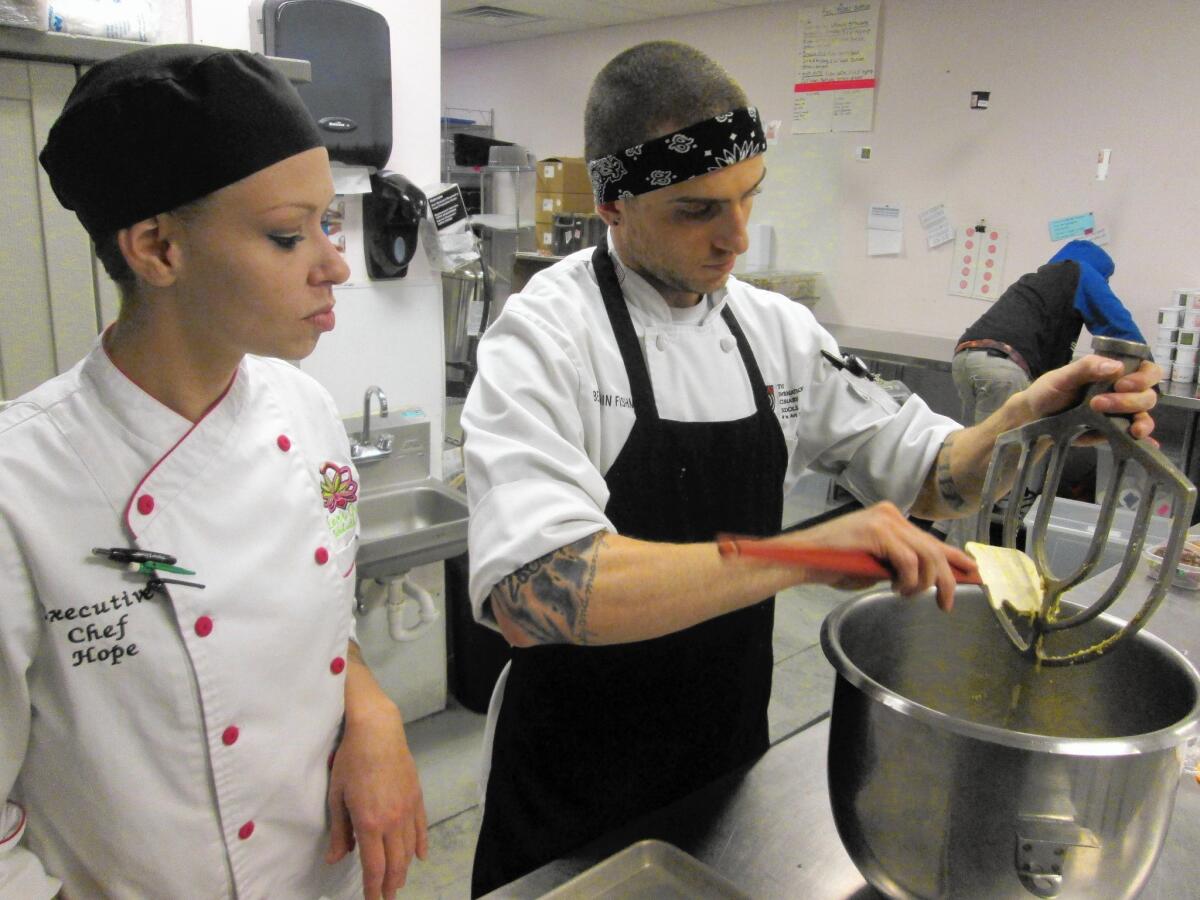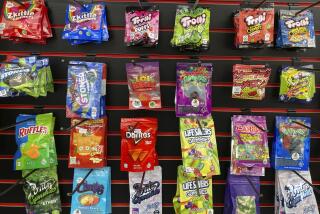Denver pot bakery puts the high into haute cuisine

It was midafternoon and a disciplined team of chefs began rolling out the day’s offerings — four kinds of baklava, oatmeal butterscotch cookies and a toothsome Parisian macaroon.
There wasn’t a pot brownie in sight, and the mere mention of it caused Hope Frahm’s eyes to narrow.
“That’s the first thing people think of when you tell them you work with marijuana,” said the executive chef at Love’s Oven, a cannabis bakery near downtown Denver. “But we are developing croissants, eclairs, maple bacon bars, olive oil. The sky’s the limit.”
Here in the national epicenter of legalized marijuana, where rules on getting stoned are still being hammered out, Frahm is busily elevating food that gets people high into something approaching haute cuisine.
The classically trained pastry chef, who worked under famed restaurateurs Wolfgang Puck and Thomas Keller, is bringing skills she learned in those kitchens to Colorado’s burgeoning edible cannabis industry.
“Everything I know about molecular gastronomy and portion control translates so well to cooking with marijuana,” said Frahm, wearing a spotless white smock and snug black cap. “It’s just another ingredient.”
Well, not quite.
The Colorado Department of Public Health and Environment has recommended limiting edibles to lozenges and liquid concentrations called tinctures. To support that stance, officials cited cases of children eating cannabis-laced cookies and candy.
There also have been high-profile overdoses, including a college student who leaped to his death from a hotel balcony after eating a cookie with 65 milligrams of THC, the active ingredient in marijuana. Others have reported galloping paranoia and hallucinations lasting for hours.
Frahm’s motto is “start low, go slow.”
“If you do 10 shots of tequila you’re going to get sick,” she said. “That’s why we don’t make cookies with 100 milligrams of THC — we make them smaller, with 10 milligrams each.”
Former health insurance executive Peggy Moore owns Love’s Oven. Her business supplies some 100 marijuana shops statewide and is among the biggest producers of pot edibles in Colorado. She recommends one 10-milligram cookie for the average user.
“It’s like a glass of wine that lasts for six hours,” she said. “For most people that’s as high as you ever need to get.”
Restricting the products, she said, would simply drive them onto the black market.
“Right now edibles make up 45% of the market,” she said. “And as the market develops we are seeing a more discerning palate evolve, which we are trying to satisfy.”
There is little groovy or whimsical about the exacting edible industry. State regulators require that every gram of marijuana be accounted for. Security is tight. Cameras monitor kitchens, and anyone caught sampling the goods is sacked.
“It’s all about the science. You can’t take shortcuts,” said Benjamin Fishman, a chef at Love’s. “It’s also challenging because I can’t taste anything I make. I’m used to going down the line with a spoon and tasting everything. Do that here and you get fired.”
And really, really high.
The not-so-secret ingredient in everything at Love’s is the aromatic, cannabis-infused green butter. Once made, it’s sent to a licensed laboratory that determines its potency.
“It tastes like a strong tarragon,” Frahm said, sniffing a tub of the stuff. “We don’t try to erase the flavor. We complement it with ginger, apple, cinnamon and chocolate.”
She recently catered a cannabis brunch featuring sticky buns, sweet potato pancakes and brioche French toast.
“We dosed them really low at 5 milligrams,” said Frahm, 30, who rarely eats cannabis herself. “You could see people wondering how many more pancakes they could have.”
The quietly intense chef rarely strays from her calculator, constantly figuring out the amount of THC in her products. Pastries sold to recreational marijuana outlets are usually dosed lower than those sent to medicinal shops, where a cookie might contain 400 mg of THC.
Prices vary, but a single 10-milligram cookie costs about $5 and a box of 10 goes for $20. Baklava laced with 10 milligrams of THC runs $20 for a box of 10. Far more potent medicinal edibles are pricier, going for up to $15 a cookie.
Raul Sanchez, a packager at Love’s, eats cannabis daily.
“It tastes great and it gets me high,” he said.
Frahm wouldn’t know. She lost her sense of taste before becoming a chef.
“I was working under a car and it fell on me. As I tried to get out I broke a hose that sprayed scalding fluid into my mouth and destroyed my sense of taste,” she said. “I use smell and memory now. I taste vicariously through my customers.”
Her dream is to be the next Auguste Escoffier, the vaunted French chef.
“I want to be the Escoffier of marijuana,” she said with a smile.
More to Read
Start your day right
Sign up for Essential California for news, features and recommendations from the L.A. Times and beyond in your inbox six days a week.
You may occasionally receive promotional content from the Los Angeles Times.






